
Intellectual property rights are the ownership rights you have over things that you create as a result of your original ideas. If your creation has economic value, you will want to learn how to protect your intellectual property (IP) against any party that may try to use it for themselves.
Exactly how to protect intellectual property depends upon the nature of the intellectual property. To help you learn more about IP protection and its various forms, this article will cover:
- 4 different intellectual property rights
- 4 tips to protect intellectual property
- The basics of intellectual property enforcement
- How to fight theft of intellectual property
View the infographic below for a helpful summary of intellectual property protection and tips on guarding your creative ideas:
What are the 4 types of intellectual property protections?
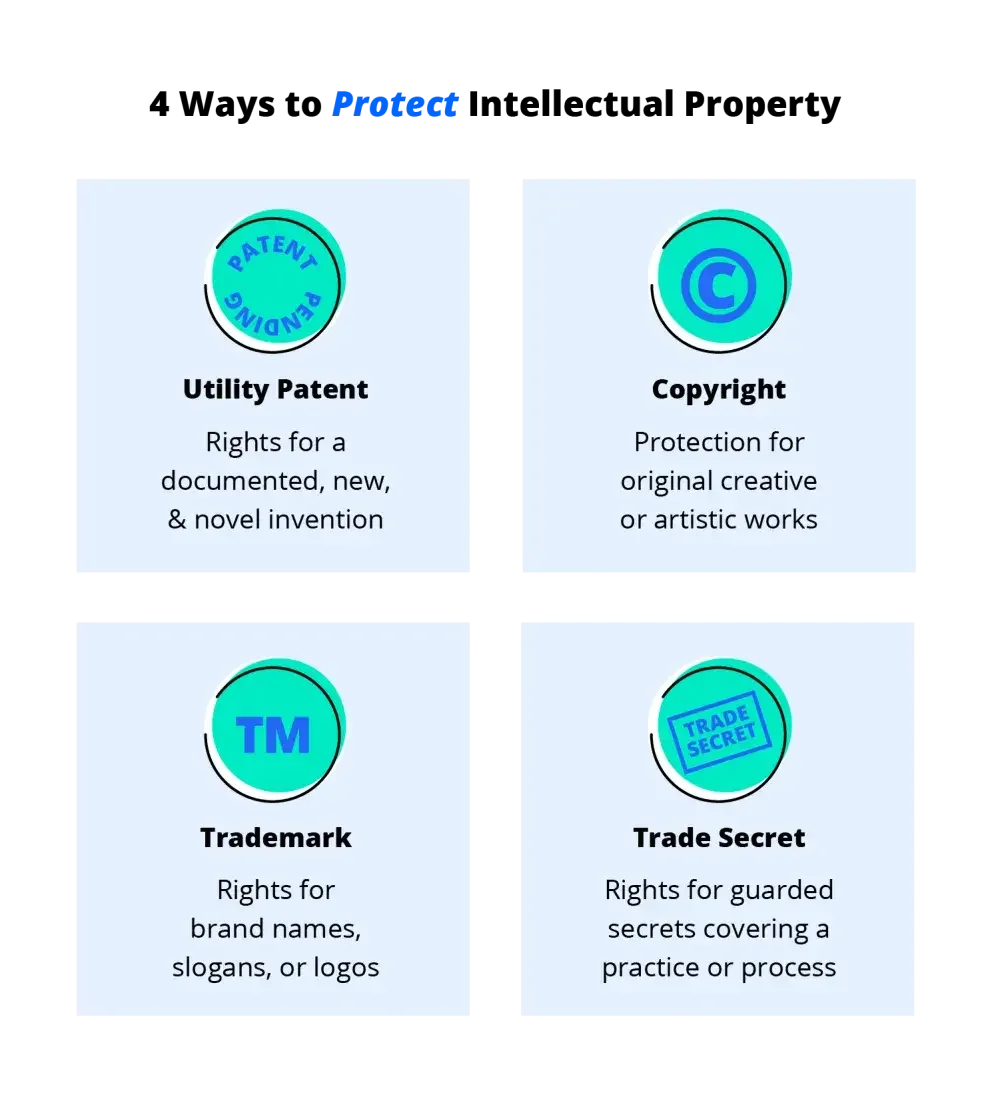
Copyrights, trademarks, patents, and trade secrets are the four primary types of intellectual property protection.
Determining the best way to protect intellectual property can be complex. This can be especially true in highly technical areas like industrial design or computer algorithms.
- Example: Someone who writes and markets new computer programs may need to copyright and patent the code and algorithms, as well as register a trademark for marketing them.
Deciding on intellectual property protection takes careful consideration, so an intellectual property attorney can ease your mind and help make sure your property is fully protected.
1. Copyrights
Copyrights protect written and artistic works for the lifetime of the creator, plus 70 years.
These creative works are the tangible representation of the creator's original ideas, since ideas themselves can't be protected. Copyrights can protect manuscripts, novels, song lyrics, paintings, photographs, sound recordings, and more.
A copyright exists the moment the author creates the original work, but registration provides copyright owners with exclusive and enhanced rights. It can help enforce their rights against infringement through litigation and allows owners to seek monetary damages and attorneys fees if there is a lawsuit.
2. Trademarks
Trademarks can protect words, phrases, symbols, and logos that identifies one's goods or services. A trademark registration can last forever, as long as it's continued to be used in business, and is renewed every 10 years. This makes the trademark one of the most crucial IP protections for businesses.
A business' intellectual property makes sure the business is reliably recognizable for patrons. This means that you won't be able to trademark a logo that is similar to one of your competitors if it could cause confusion among consumers.
3. Utility patents
Utility patents protect inventions of different kinds for 20 years. The key to a patent's protection is that the invention must be new or novel, meaning you can't patent something that already exists.
4. Trade secrets
Trade secrets are a form of intellectual property that your company may keep close and choose not to share with others. This could be to protect an economic advantage that might be lost should your trade secret become public knowledge or be stolen by a competitor.
Since they're not public and aren't filed with any official office, trade secrets offer no official protection for your intellectual property. But as long as you can provide evidence that you made efforts to hold and protect the trade secret, any theft of it is punishable in court. This punishment could be criminal, since corporate espionage (or intercompany theft of ideas) is a federal offense.
4 tips for protecting intellectual property
Protecting your intellectual property is a means to secure an economic advantage for your business and make sure you can defend your unique ideas, products, and services. The best way to protect IP is to register it with the government and enforce your ownership rights.
Beyond registration and enforcement, you can protect certain types of intellectual property by:
- Documenting your discoveries
- Using digital rights management
- Opting for strong nondisclosure agreements
- Creating strong access credentials
Read on for more on these tips to proactively protect intellectual property before it's stolen or repurposed.
1. Document your discoveries
In the Information Age, leaks are frequent. While you can't always guard against them, you can record your discoveries and innovations as they occur.
If another company obtains illicit information in a leak and attempts to repurpose or recreate your ideas, your records can put a date to your operations and prove your legitimacy (and your ownership rights) over your intellectual property.
2. Use digital rights management (DRM) systems
If your work is published online and accessible to users, some of those users may attempt to copy your property. Digital rights management (DRM) protects your online assets with coding that does any, or multiple, of the following:
- Limits the number of times or the window of time a user can access your work
- Restricts the number of devices your work can be accessed with
- Prevents users from editing, saving, or copying your work
- Prohibits sharing, printing, or taking a screenshot of your work
- Watermarks your work to establish ownership
DRM is a type of encryption that limits what a user can do with your protected work. This option is a common choice for gated online content like:
- Data studies and surveys
- Market reports
- E-books
- Software
With DRM, unauthorized use or reproduction of your online IP is much more difficult, if not impossible.
3. Opt for strong nondisclosure agreements
A nondisclosure agreement (NDA) restricts any involved party from sharing information defined by the terms of the agreement.
Draft an NDA to strengthen your defenses against IPR violations like trade secret misappropriation, where an employee could share sensitive IP-related information with outsiders.
4. Create strong access credentials
Guarding a secret requires proactive action, unless you're the only person who knows the secret. Without adequate security around a trade secret, courts won't be convinced that the secret was important enough to guard. Use strong credentials to restrict access to any valuable information, especially relating to intellectual property.
This might mean:
- Separating teams so access to files isn't shared
- Training employees on your company's security best practices
- Frequently updating passwords
As with any security protocols, leaks can still happen. If your intellectual property is compromised, it might be time to speak with an intellectual property expert to determine your options for IPR enforcement.
How does intellectual property enforcement work?
When another party attempts to violate your IP rights, it's called infringement, or misappropriation when referring specifically to trade secrets. IP violations are civil or criminal matters depending on the type of IP protection infringed upon and the severity of the violation.
Enforcing intellectual property violations isn't always easy, but you can prepare yourself to fight violations with proper knowledge of how different violations are handled.
IP violations for the four main types of intellectual property protections vary. Mostly civil matters, they can rise to criminal offenses if malicious intent or purposeful harm is shown as a result of the infringement or misappropriation.
Patent infringement
Getting a patent isn't as easy as filling out some paperwork. Patents are complex technical documents that require significant effort to draft and file.
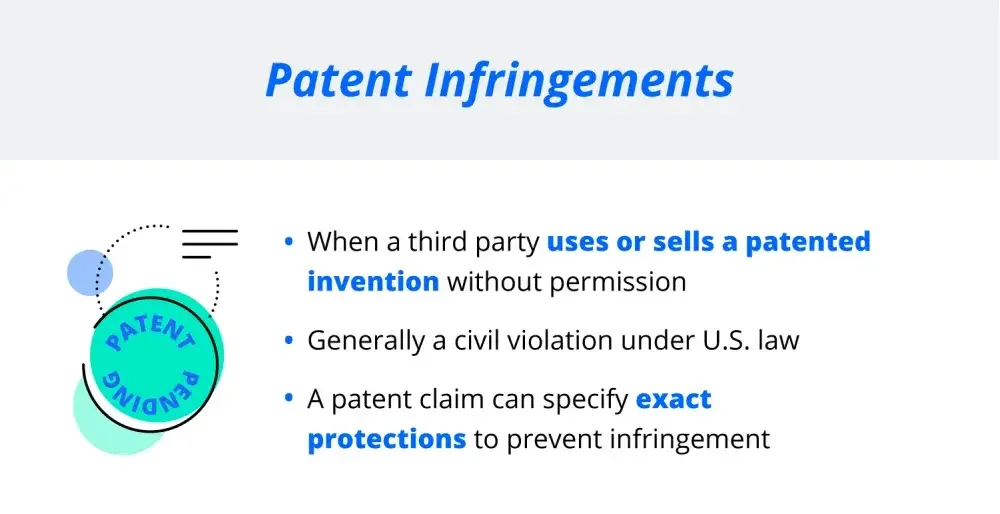
As the inventor, it's your duty to prove your case that your invention is new, novel, and worthy of protection. A patent clearly claims in precise language what you own as the inventor, and is your proof of infringement in case a copycat shows up.
Copyright infringement
Copyrights are a more abstract legal right than patent protections since they cover artistic works like essays, drawings, and songs.
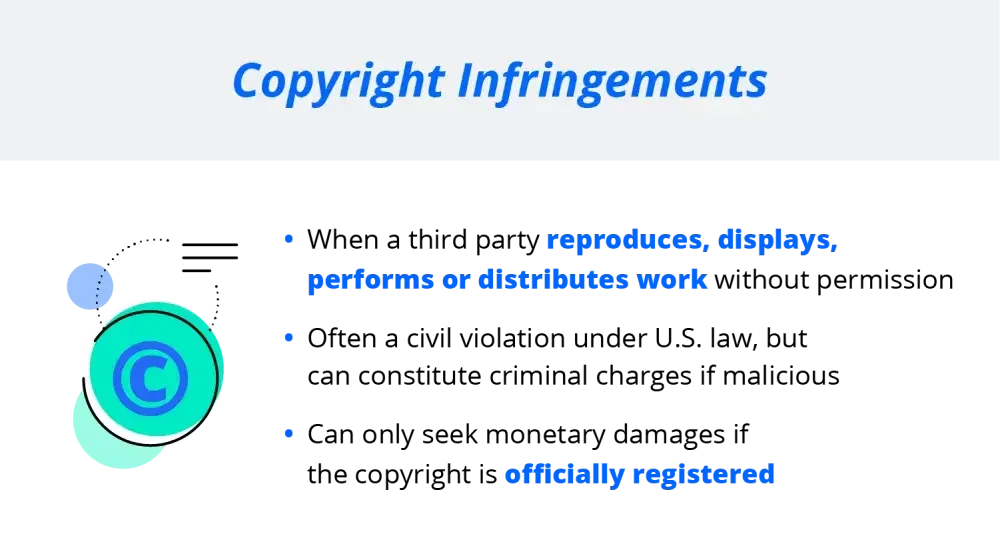
Copyright registration isn't required to obtain a copyright, but it can help you regain damages when defending your IP. A copyright is registered with the U.S. Copyright Office.
Trademark infringement
Trademark protections don't just protect the name or design of your business or logo, they also protect what that name or logo represents.
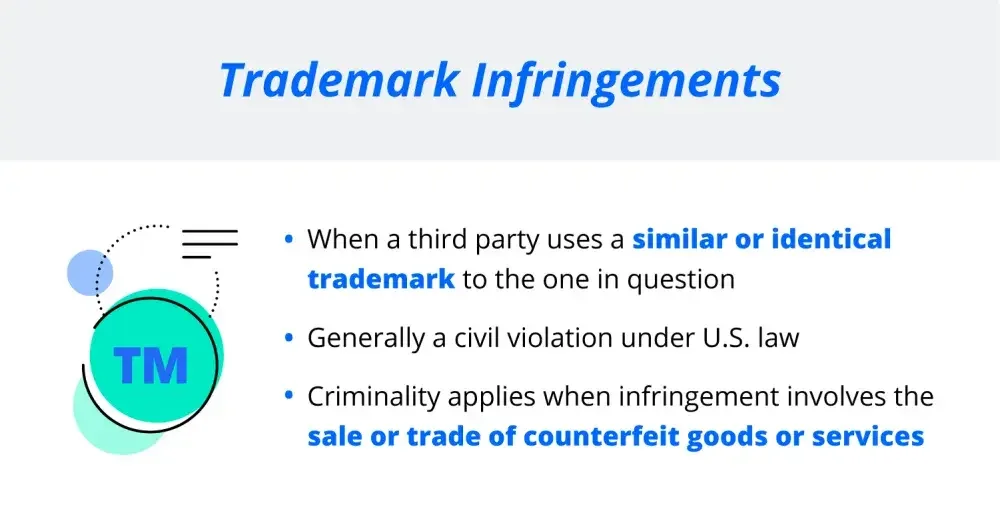
Trademark litigation often hinges on the likelihood of confusion among customers as to the source of goods or services.
Trade secret misaappropriation
Trade secrets aren't officially protected, but this can often mean that they're more protected than other forms of intellectual property, because they're widely unknown and therefore can't be copied.
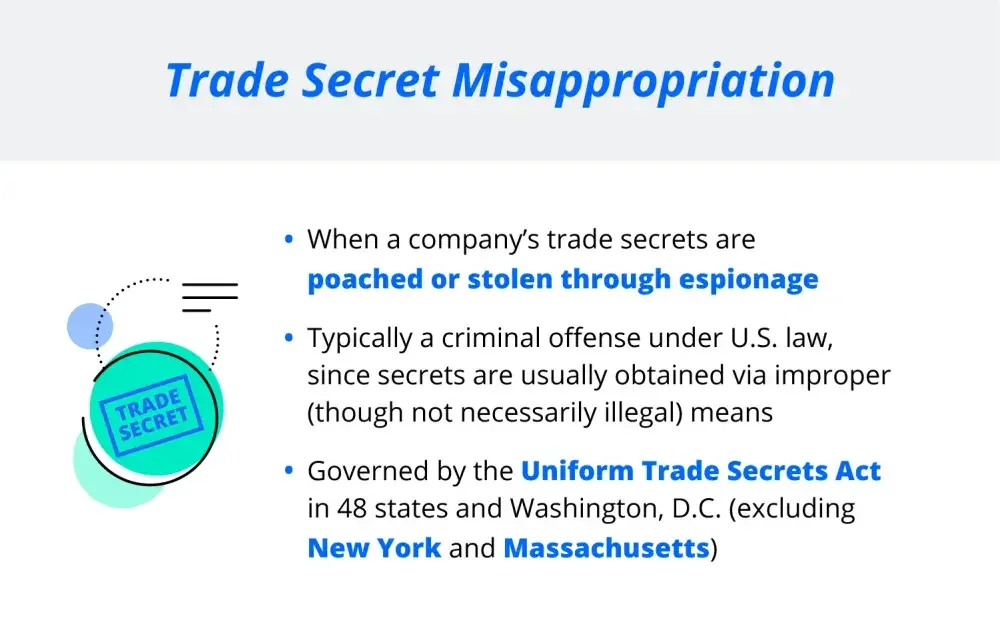
To claim a compromised trade secret, you must demonstrate that the secret is under lock and key—without legitimate protection, it's unlikely that a court will back up your claim.
How to fight theft of intellectual property
If a third party steals your intellectual property rights, you need to have protections in place to fight the theft. If you haven't registered or protected your IP, you may still be able to halt the reproduction of your ideas, but you may not be entitled to any monetary damages.
You have two options to stop an IP violation in progress, but it's important to remember that registering your IP protections is your best chance of fighting any impersonator or infringers in court.
1. Send a request to stop the violation
The first option to halt an IP infringement is to request that the violating action in question be stopped. This doesn't need to be a threatening request but instead a warning notice. It states your ownership claim over the property in question and notes that you're requesting the recipient stop all actions related to the reproduction or usage of your intellectual property.
- Example: You own the publishing rights to a certain song that was recently featured in a YouTube video by a popular influencer. You may send a request for YouTube to remove the video to protect your IPR. The request likely won't result in you being paid any monetary damages, but the influencer will be warned against committing similar offenses in the future.
2. Pursue legal action
If a cease and desist either doesn't work or isn't applicable to your IP violation claim, it may be time to pursue legal action against the infringer. You can't take this step unless your work was previously registered and protected—if you decide to pursue legal action, you'll need to register the work in question first, and you won't be able to recover any damages from the time before the work was registered.
- Example: You own a registered trademark that protects the branding and marketing for a popular board game. An online competitor creates a product that resembles yours and you believe it causes confusion for customers. You might file a civil case suing for an injunction to stop the reproduction and sale of the competitor's product and for monetary damages and losses.
IP protection prevents malicious actors (anyone who might try to actively infringe your IP rights) and puts a stop to accidental misusage (anyone who may unintentionally infringe your IP rights). If your business is intellectual property intensive, it's likely to be a target for others looking to make a quick profit by stealing your ideas.
Learn how to defend expressions of your ideas against theft by registering your intellectual property and speaking with an intellectual property attorney who can help ensure that the best possible protection is secured for your work.


